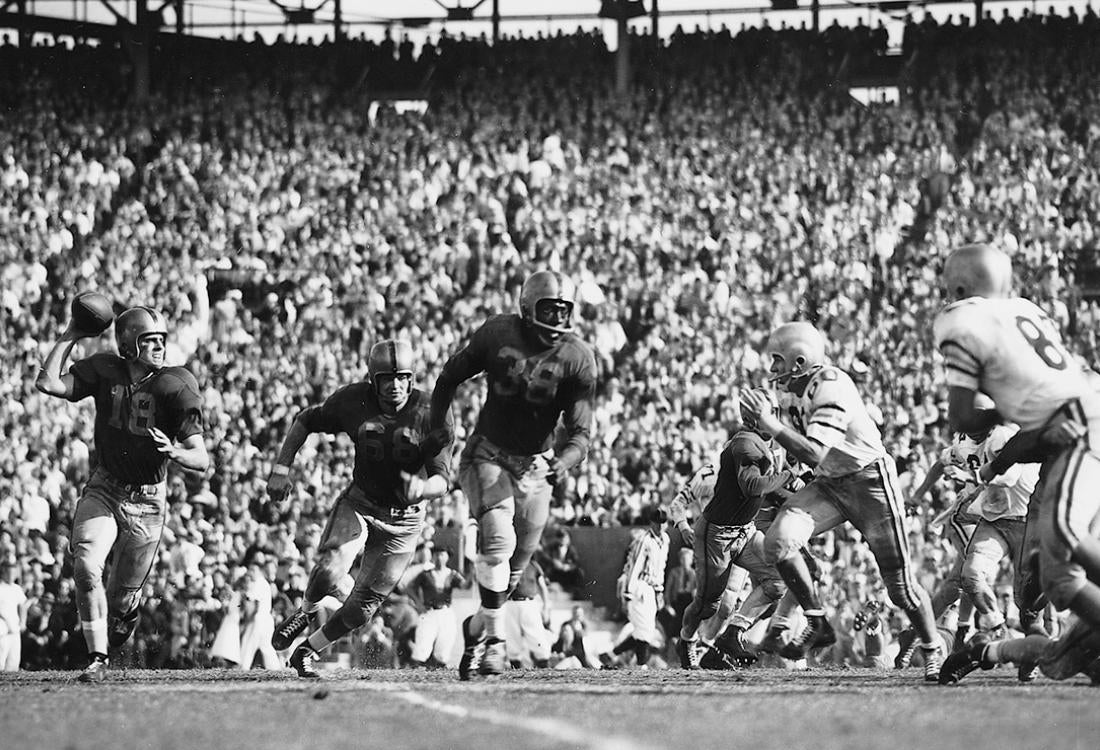
Robert “Bobby” Grier Sr., who as a member of the University of Pittsburgh football team generated national headlines during the civil rights era when he became the first Black player in the Sugar Bowl, passed away on June 30 at the age of 91.
Grier played fullback, linebacker and defensive back for the Panthers, lettering in three consecutive seasons from 1953 to 1955.
As a senior, he led the team in interceptions to help Pitt to a 7-3 regular season and receive an invitation to play Georgia Tech in the Sugar Bowl in New Orleans.
The governor of Georgia, segregationist Marvin Griffin, vehemently opposed Grier's participation in the game. On Dec. 2, 1955, a month prior to the Sugar Bowl, Marvin told the Georgia State Board of Regents, “The South stands at Armageddon. The battle is joined. We cannot make the slightest concession to the enemy.”
The prospect of Grier traveling to the Deep South to break the color barrier of one of college football’s highest profile postseason games sparked nationwide discussion the same month that Rosa Parks was arrested in Montgomery, Alabama, for refusing to surrender her bus seat to a white passenger.
“Bobby Grier’s story was national headlines. It was on the front page of every major newspaper in the country,” recalled late college football commentator Beano Cook to the Pittsburgh Post-Gazette in 2005. “This was a major, major story — this was the South in 1955 and this was the Sugar Bowl. Think about it. The governor of Georgia urged Georgia Tech not to play in the game because Pitt had a Black player, and he said it because he figured it would help get him reelected. That’s just where we were in this country."
But Grier had the strong support of his teammates and University leadership, who vowed “No Grier, no game.” Support for Grier also came from Georgia Tech students and football players, who protested against Griffin, burning him in effigy outside the governor’s mansion.
Grier took the field against Georgia Tech on Jan. 2, 1956, rushing for a game-high 51 yards. Pitt lost the game, 7-0, with a disputed pass interference penalty on Grier looming large in the final result. Photographic evidence later strongly indicated the referee’s call was incorrect.
Following the game, the Pitt and Georgia Tech teams were invited to a banquet in New Orleans at the St. Charles Hotel, which served only white patrons. As Grier stepped off the team bus, several Georgia Tech players, all from the South, greeted Grier and told him, “You’re eating with us.”
Grier received the loudest ovation of any of the Sugar Bowl participants when he walked into the banquet hall. “That made me feel good, made me feel special,” Grier said.
More than six decades later, Grier again stepped onto the Sugar Bowl playing field when he was introduced as a member of the Sugar Bowl Hall of Fame on Jan. 1, 2019.
Additionally, he is a member of the Pitt Athletics Hall of Fame, Western Chapter of the Pennsylvania Sports Hall of Fame and the Wall of Champions at Ohio’s Massillon High School, where he led the Tigers to a pair of state championships.
Grier earned his bachelor’s degree from Pitt’s College of Business Administration in 1957. He served in the Air Force for 12 years, working primarily on radar and missiles, and left as a captain. Grier then worked as a supervisor for U.S. Steel and as an administrator at Community College of Allegheny County until his 1998 retirement.
In his later years, Grier served the Elizabeth Dole Foundation to help provide caregiving for veterans.
Beyond his public achievements, Grier’s greatest pride was his family. He was a devoted husband to his late wife, Dorothy; a loving father to his children, Rob Jr. and Cassandra; and a cherished grandfather to Camille.
Dorothy earned her Bachelor of Science, Master of Education and Doctor of Philosophy degrees from Pitt’s School of Education.
Rob Jr. honored his father’s legacy by serving as his caregiver since 2010, exemplifying the love and commitment that defined Grier’s life.
“Bobby Grier is the epitome of the Pitt student-athlete,” said Chancellor Joan Gabel. “Striving to compete alongside his teammates at the highest level possible, he played with courage, grace and conviction, and he helped drive the national conversation toward justice at a pivotal time in American history. The University of Pittsburgh is enormously proud to call Bobby an alum. We express our deepest condolences to his family and friends at the loss of a great man.”
“Bobby Grier lived a truly remarkable and impactful life that inspires in so many ways,” Director of Athletics Heather Lyke said. “The courage and dignity he showed in desegregating the Sugar Bowl stands as one of the most important moments not only in the history of the University of Pittsburgh but also the game of college football. One of my most gratifying moments was having the opportunity to take part in his enshrinement in the Pitt Athletics Hall of Fame in 2021. His legacy, on and off the field, will always burn brightly at Pitt. We extend our deepest condolences to the Grier family and Bobby’s many loved ones.”
“I had only been at Pitt a few weeks when I first met Bobby Grier,” said Pat Narduzzi, the Panthers’ Chris Bickell ’97 Head Football Coach. “He was visiting our practice facility and I remember leaving a meeting so I could see him in person and shake his hand. Bobby is an absolute Pitt icon, and I was immediately struck by his humbleness and warmth. His pride in being a Pitt man was on his sleeve, and that was so inspiring to me. We are so proud to continually tell Bobby’s story to new generations of Pitt football players. He really represents the best of our program.”
As a tribute to Grier, the Pitt football team will wear a commemorative helmet sticker throughout the 2024 season.



